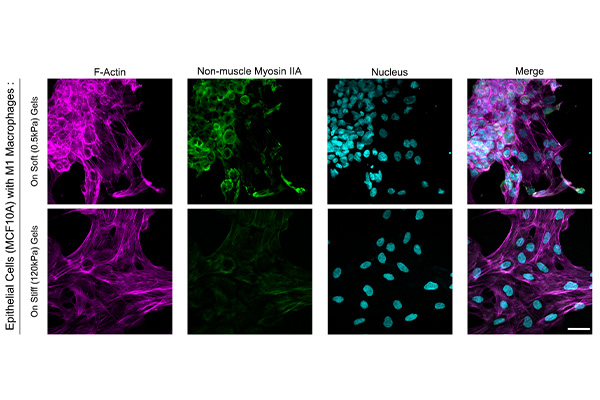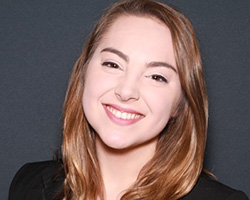Immune cells boost epithelial cell clustering
Researchers in Amit Pathak’s lab found that macrophages can alter cellular clustering behavior

Macrophages are frontline fighters in the body’s immune response, gobbling up and removing foreign microbes, cancer cells and other cellular debris. In addition to defending against foreign invaders directly, macrophages can cause inflammation to recruit more immune cells.
Researchers in the McKelvey School of Engineering at Washington University in St. Louis recently found that proinflammatory macrophages can also influence multicellular clustering in biological processes including organ development and wound healing as well as in malignant diseases such as cancer.
A new study from Amit Pathak, associate professor of mechanical engineering & materials science, and Hannah Zmuda, a graduate student in Pathak’s lab, revealed that epithelial cells, which form the lining of organs and blood vessels and perform many essential bodily functions, migrate faster and form larger multicellular clusters in soft environments when proinflammatory macrophages are present. The results were published online June 30 in The FASEB Journal.
“There was little work done previously combining macrophages and epithelial cells in a co-culture, so we were not sure if macrophages would exacerbate epithelial clustering,” said Zmuda, who proposed this line of inquiry for her National Science Foundation Graduate Research Fellowship. “We thought the proinflammatory macrophages might come into the environment and eat the epithelial cells, impeding healing. Instead, we found that in soft environments where epithelial cells and macrophages have time to interact, there’s a boost in clustering.”
“Surprisingly, we only found macrophages to positively impact cell clustering on soft substrates, not stiff substrates where epithelial cells already migrate very fast,” Pathak added.
These findings illuminate the significance of both immune and mechanical factors in controlling epithelial cell behavior, potentially providing a roadmap for manipulating tumor growth and wound healing.
“Next, we plan to look more at wound healing and injury response,” Pathak said. “We're going to look at whether macrophage-boosted clustering happens slower or faster on surfaces with injuries and whether the clustering helps with healing or makes it worse. Sometimes in wound healing, if there is too much clustering, then you get scarring or fibrotic healing, which leads to very stiff, unhealthy tissue.”
Zmuda H and Pathak A. Epithelial multicellular clustering enabled by polarized macrophages on soft matrices. The FASEB Journal, June 30, 2023. DOI: https://faseb.onlinelibrary.wiley.com/doi/10.1096/fj.202300120RR.
This work was supported by the National Institutes of Health/National Institute of General Medical Sciences MIRA (R35GM128764) and National Science Foundation Graduate Research Fellowship Program (DGE-2139839 and DGE-1745038).





